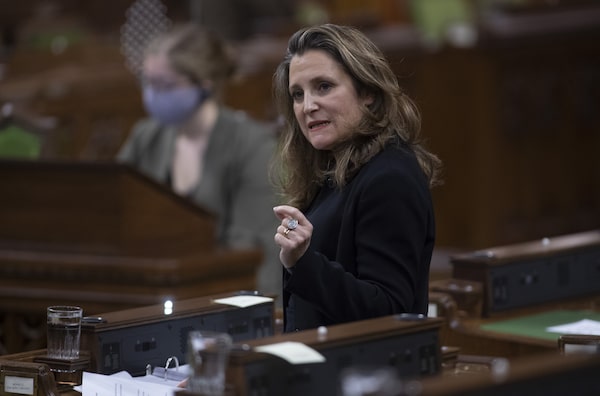
Deputy Prime Minister and Minister of Finance Chrystia Freeland responds during question period in the House of Commons on Dec. 1, 2020 in Ottawa.Adrian Wyld/The Canadian Press
As Finance Minister Chrystia Freeland prepares to table the first federal budget in two years, Canadians should keep in mind that the debt accumulated during the pandemic – and the debt Ottawa is poised to take on in its immediate aftermath – will need to be repaid some day.
The extraordinary amount of income support provided by the federal government during the pandemic led to a 75 per cent increase in federal spending in the 2020-21 fiscal year that ended on March 31. The Parliamentary Budget Officer (PBO) has pegged federal expenditures at $652-billion in 2020-21, compared to $373-billion in 2019-20. A year-over-year increase of this magnitude has never been seen outside of wartime.
The C.D. Howe Institute estimates that, for every dollar Ottawa spent on programs last year, it borrowed 50 cents. Overall, the federal debt hit nearly $1.1-trillion in the year to March 31, up from $712-billion a year earlier, and is on its way to $1.3-trillion by 2024.
What’s more, in her Fall Economic Statement, Ms. Freeland signalled her government’s intention to spend an additional $70-billion to $100-billion over three years to finance a stimulus program that the PBO this week said could be “mis-calibrated” given signs that economic and job growth appear set to exceed forecasts made in Ottawa’s fall update.
That is not likely to stop Prime Minister Justin Trudeau’s Liberals from tabling what is expected to be a pre-election budget that promises not only a massive one-time stimulus program, but additional permanent spending measures related to new program launches. While some programs, such as national daycare or pharmacare, might be worthy in themselves, they may not be financially sustainable without new taxes on the middle class or cuts to other programs.
Unfortunately, no one in Ottawa appears willing to admit that, at least not before the next election.
The PBO projects Ottawa’s deficit for 2020-21 will come in at $363-billion, or 16.5 per cent of gross domestic product. This constitutes the largest budget deficit since the beginning of modern record-keeping in the 1960s. This year’s deficit is likely to exceed the $121-billion, or 5.2 per cent of GDP, that was projected in the fall economic statement as Ms. Freeland delivers on her pledge to “make smart, targeted and data-driven investments to boost jobs and growth.”
An election might change things, but no party in Ottawa is expected to campaign on a promise of fiscal consolidation. That would require telling Canadians the truth about the tough decisions Ottawa will face in the next few years as it moves to unwind pandemic-related spending programs and chart a credible course to a balanced budget. Still, there will be no way for whichever party wins the next federal election to avoid a fiscal reckoning.
The PBO estimates Ottawa’s net-debt to GDP ratio will surge this year to 49.8 per cent from 31.2 per cent in 2019-20. While this remains well below the peak of 67 per cent hit in 1995-96, when Jean Chrétien’s government was forced to make a 180-degree turn on fiscal policy in the face of a reluctance by investors to buy Canadian government bonds, provincial debt loads were far smaller back then.
In the mid-1990s, Ontario and Quebec had net debt-to-GDP ratios of 30 per cent and 33 per cent respectively. Ontario’s debt ratio is set to surpass 50 per cent in 2022, while Quebec’s will rise above 45 per cent next year. Yes, interest rates are much lower now, but it would be imprudent for any government to count on them remaining that way when aggregate government debt in Canada is already on track to exceed its 1995 peak.
The ease with which Ottawa has been able to borrow its way through the pandemic has created a false impression that financial markets are not that worried about Canada’s surging public debt levels. The Bank of Canada’s move to purchase almost half of the federal bonds in circulation has effectively made it look all too easy. But the central bank must eventually unwind these purchases and Ottawa must repay its debts. If notoriously fickle financial markets begin to worry that inflation will erode the value of their bonds, all bets are off.
It is critical for Canada to repay its pandemic-related debts as soon as possible. The next crisis or recession is always just around the corner, and Ottawa needs to start preparing for it as soon as this one is over. It cannot kick the can down the road.
“It is hard to make a convincing case that the benefits of stabilizing the economy [during the pandemic] extend beyond Canadians alive today,” argues University of Calgary School of Public Policy executive fellow John Lester in a recent C.D. Howe Institute study. “Fairness requires that the lockdown-induced increase in debt be retired before the next generation starts working and paying taxes.”
Does anyone in Ottawa have a plan for that?
Keep your Opinions sharp and informed. Get the Opinion newsletter. Sign up today.